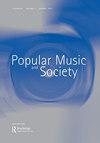American Punk and the Rhetoric of “Political Correctness”
IF 1.3
3区 艺术学
0 MUSIC
引用次数: 0
Abstract
ABSTRACT In the Trump era, conservative and alt-right commentators have framed punk rock subculture as a right-wing phenomenon, emphasizing punk’s individualism and “politically incorrect” rebellion as its defining characteristics. Taking a cultural studies approach, this article examines the rhetoric of so-called “political correctness” in contemporary American discourses surrounding the intersection of punk and politics. Its primary argument is that asserting an anti-PC stance disguises an underlying conservative agenda or reinscribes dominant narratives and that punk’s lack of a stable or inherent meaning (the “floating” nature of its signification, as Dick Hebdige described it) leaves it open to such rhetorical uses.美国朋克与“政治正确”修辞
在特朗普时代,保守派和另类右翼评论员将朋克摇滚亚文化视为一种右翼现象,强调朋克的个人主义和“政治不正确”的反叛是其定义特征。本文采用文化研究的方法,考察了当代美国围绕朋克与政治交叉的话语中所谓的“政治正确”的修辞。它的主要论点是,主张反pc的立场掩盖了潜在的保守议程或重新定义了主导叙事,朋克缺乏稳定或固有的意义(正如迪克·赫伯迪(Dick Hebdige)所描述的那样,其意义的“浮动”性质),使其易于被这种修辞使用。
本文章由计算机程序翻译,如有差异,请以英文原文为准。
求助全文
约1分钟内获得全文
求助全文
来源期刊

POPULAR MUSIC AND SOCIETY
MUSIC-
CiteScore
1.10
自引率
0.00%
发文量
33
期刊介绍:
Popular Music and Society, founded in 1971, publishes articles, book reviews, and audio reviews on popular music of any genre, time period, or geographic location. Popular Music and Society is open to all scholarly orientations toward popular music, including (but not limited to) historical, theoretical, critical, sociological, and cultural approaches. The terms "popular" and "society" are broadly defined to accommodate a wide range of articles on the subject. Recent and forthcoming Special Issue topics include: Digital Music Delivery, Cover Songs, the Music Monopoly, Jazz, and the Kinks. Popular Music and Society is published five times per year and is a peer-reviewed academic journal supported by an international editorial board.
 求助内容:
求助内容: 应助结果提醒方式:
应助结果提醒方式:


